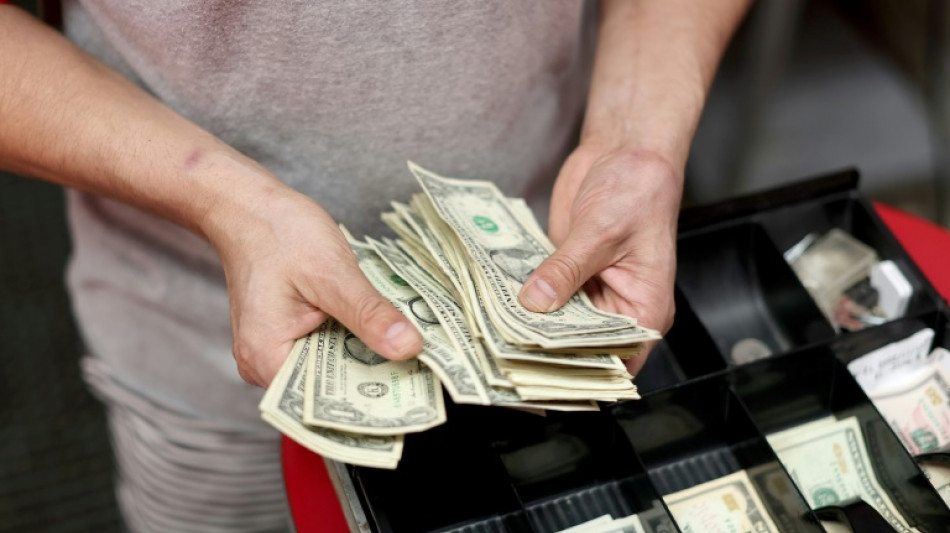
-
 Google must open Android to rival app stores: US court
Google must open Android to rival app stores: US court
-
Amazon profits surge 35% as AI investments drive growth

-
 Zelensky urges allies to seek 'regime change' in Russia
Zelensky urges allies to seek 'regime change' in Russia
-
Trump envoy to inspect Gaza aid as pressure mounts on Israel

-
 US theater and opera legend Robert Wilson dead at 83
US theater and opera legend Robert Wilson dead at 83
-
EA shooter 'Battlefield 6' to appear in October

-
 Heavyweight shooter 'Battlefield 6' to appear in October
Heavyweight shooter 'Battlefield 6' to appear in October
-
Justin Timberlake says he has Lyme disease

-
 Atkinson and Tongue strike as India struggle in England decider
Atkinson and Tongue strike as India struggle in England decider
-
US theater and opera auteur Bob Wilson dead at 83

-
 Trump envoy to visit Gaza as pressure mounts on Israel
Trump envoy to visit Gaza as pressure mounts on Israel
-
In Darwin's wake: Two-year global conservation voyage sparks hope

-
 Microsoft valuation surges above $4 trillion as AI lifts stocks
Microsoft valuation surges above $4 trillion as AI lifts stocks
-
Verstappen quells speculation by committing to Red Bull for 2026

-
 Study reveals potato's secret tomato past
Study reveals potato's secret tomato past
-
Trump's envoy in Israel as Gaza criticism mounts

-
 Squiban solos to Tour de France stage win, Le Court maintains lead
Squiban solos to Tour de France stage win, Le Court maintains lead
-
Max Verstappen confirms he is staying at Red Bull next year

-
 Mitchell keeps New Zealand on top against Zimbabwe
Mitchell keeps New Zealand on top against Zimbabwe
-
Vasseur signs new contract as Ferrari team principal

-
 French cities impose curfews for teens to curb crime
French cities impose curfews for teens to curb crime
-
Seals sing 'otherworldly' songs structured like nursery rhymes

-
 India captain Gill run out in sight of Gavaskar record
India captain Gill run out in sight of Gavaskar record
-
Trump's global trade policy faces test, hours from tariff deadline

-
 Study reveals potato's secret tomato heritage
Study reveals potato's secret tomato heritage
-
Wirtz said I would 'enjoy' Bayern move, says Diaz

-
 West Ham's Paqueta cleared of betting charges
West Ham's Paqueta cleared of betting charges
-
AI gives stocks a lift, dollar mixed tracking Fed, tariffs

-
 Authorities abandon recovery of German Olympian killed in Pakistan
Authorities abandon recovery of German Olympian killed in Pakistan
-
Talks over France, Lions game 'progressing': Benazzi

-
 Popovici ready to hit the beach after world swim sprint double
Popovici ready to hit the beach after world swim sprint double
-
Magic Marchand adds gold to world record as McIntosh wins again

-
 Sweden jihadist jailed for life over Jordan pilot burned alive
Sweden jihadist jailed for life over Jordan pilot burned alive
-
Zelensky signs bill ensuring anti-graft agencies' 'independence'

-
 Sleepless in Singapore: Marchand wins gold, day after world record
Sleepless in Singapore: Marchand wins gold, day after world record
-
England make early double strike in India series decider

-
 Popovici wins 100m freestyle world gold for sprint double
Popovici wins 100m freestyle world gold for sprint double
-
Marchand wins 200m medley gold, day after world record

-
 Thousands of Afghans scramble for chance to work in Qatar
Thousands of Afghans scramble for chance to work in Qatar
-
Trump's envoy arrives in Israel as Gaza criticism mounts

-
 McIntosh powers to third gold of worlds, 12-year-old Yu fourth
McIntosh powers to third gold of worlds, 12-year-old Yu fourth
-
Hong Kong sees 3.1% growth in second quarter

-
 Stocks, dollar mixed tracking Fed, tariffs, results
Stocks, dollar mixed tracking Fed, tariffs, results
-
World Athletics brings in gene tests for female category eligibility

-
 Trump says tariffs are making US 'great & rich' again
Trump says tariffs are making US 'great & rich' again
-
Pakistan opposition leader given 10 years for Imran Khan protests

-
 India's Bumrah out of Oval finale as England bowl in fifth Test
India's Bumrah out of Oval finale as England bowl in fifth Test
-
Rights groups urge Nepal to reverse Telegram ban

-
 BMW says can weather tariff storm despite profit plunge
BMW says can weather tariff storm despite profit plunge
-
Zelensky urges allies to push for 'regime change' in Russia

| SCU | 0% | 12.72 | $ | |
| RBGPF | 0.52% | 74.42 | $ | |
| RYCEF | 7.62% | 14.18 | $ | |
| CMSC | 1.09% | 22.85 | $ | |
| BCC | -1.29% | 83.81 | $ | |
| NGG | 0.28% | 70.39 | $ | |
| BCE | -0.86% | 23.33 | $ | |
| CMSD | 0.9% | 23.27 | $ | |
| RIO | 0.47% | 59.77 | $ | |
| SCS | 0% | 10.33 | $ | |
| JRI | 0.15% | 13.13 | $ | |
| RELX | 0.21% | 51.89 | $ | |
| VOD | -2.31% | 10.81 | $ | |
| AZN | -4.79% | 73.09 | $ | |
| BTI | 0.97% | 53.68 | $ | |
| GSK | -4.9% | 37.15 | $ | |
| BP | -0.31% | 32.15 | $ |

US inflation spike also due to generous pandemic stimulus
President Joe Biden blames global supply snarls for the wave of price increases hitting US consumers and businesses, but the trillions of dollars injected into the economy during the pandemic also share responsibility.
The Covid-19 crisis disrupted manufacturing worldwide and caused shipping snags, creating global shortages of key materials that combined to push prices higher.
Amid a rapid recovery from the pandemic, US consumer prices soared seven percent last year, the highest in nearly four decades.
"Inflation has everything to do with the supply chain," Biden said during his lengthy press conference Wednesday.
But many economists and Biden's Republican opposition say massive federal stimulus and new spending also bear some of the blame for the inflation wave -- which the president's critics have labeled "Bidenflation."
"The last year, the glut of federal dollars that's been pumped into our economy, has fueled the surge in prices," said Stephanie Bice, a Republican lawmaker from Oklahoma.
Not long after he took office one year ago, Biden pushed a $1.9 trillion American Rescue Plan through Congress, the third pandemic aid program, despite overwhelming Republican opposition.
- Should have been 'smaller' -
Some economists say the package should have been more compact and targeted.
"My view last year was that the stimulus bill was needed but should be smaller," said Harvard economics professor Jason Furman, who was an adviser to former president Barack Obama.
"In retrospect, rather than being $2 trillion, it could have been $1 trillion, Furman told AFP.
Another Democratic economist, former US Treasury secretary Larry Summers, long warned that the additional stimulus though "admirably ambitious," could "set off inflationary pressures of a kind we have not seen in a generation."
However, current Treasury Secretary Janet Yellen said Thursday she expects price pressures to recede, and inflation to fall back close to two percent by the end of 2022, as supply issues ease and the Federal Reserve raises borrowing rates.
"If we are successful in controlling the pandemic I expect inflation to diminish over the course of the year and hopefully to revert to normal levels by the end of the year," Yellen said on CNBC.
But she noted that the Federal Reserve has a role to play and "needs to recalibrate monetary policy to facilitate those adjustments."
The Fed is expected to lift the benchmark borrowing rate off zero in March and hike as many as four times this year to contain inflation.
- 'Direct consequence' -
The pandemic inflation wave is not unique to the United States, but other major economies have seen more modest price increases.
The eurozone also saw record inflation, but the increase was only five percent, according to official data, while Britain saw a 30-year high of 5.4 percent.
While rising oil prices and supply chain problems are common issues, "the United States has done much more to give money to households," Furman said.
"That has led both to faster GDP growth in the United States, and also to faster inflation in the United States."
OECD chief economist Laurence Boone underlined the differing causes of rising prices on each side of the Atlantic.
"Inflation in the US is to a significant extent a direct consequence of the support to income, combined with inelastic or distorted supply," Boone said Monday at a Eurogroup meeting.
"The largest driver of inflation in the euro area is energy prices."
While European governments aimed to keep workers in their jobs during the pandemic shutdowns, Washington provided aid to workers laid off by their employers.
From March 2020 to March 2021, about $5 trillion -- bigger than the German economy -- was paid to small American businesses and households, through direct payments, generous unemployment benefits and tax credits for families with children, fueling strong consumption in the world's largest economy.
Ch.Havering--AMWN